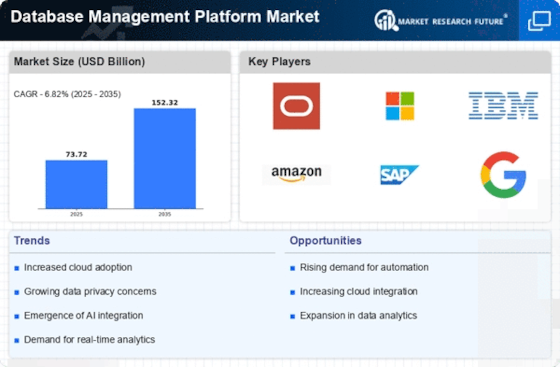Market Trends
Key Emerging Trends in the Database Management Platform Market
The database management platform market is witnessing significant market trends that are shaping the industry landscape. With the increasing need for efficient data management and the growing complexity of data environments, organizations are seeking advanced solutions to handle their database operations effectively.
One of the key market trends in the database management platform market is the adoption of cloud-based solutions. Cloud-based platforms offer several benefits, including scalability, cost-effectiveness, and flexibility. Organizations are increasingly moving their database operations to the cloud to leverage these advantages. Cloud-based platforms provide seamless access to data from anywhere, enabling businesses to make timely decisions and respond to changing market conditions.
Another noteworthy trend in the database management platform market is the rising demand for real-time analytics and insights. As businesses generate massive volumes of data, the need for real-time data processing and analysis becomes crucial. Database management platforms are incorporating advanced analytics capabilities to enable organizations to extract valuable insights from their data in real-time. This trend is driven by the increasing importance of data-driven decision making and the need to gain a competitive edge in the market.
Data security is another significant trend in the database management platform market. With the rising number of data breaches and cyber threats, organizations are prioritizing data security measures. Database management platforms are incorporating robust security features such as encryption, access controls, and threat detection to safeguard sensitive data. Additionally, compliance with data protection regulations such as GDPR and CCPA is becoming increasingly important, driving organizations to invest in secure database management platforms.
Integration with other systems and platforms is also a prominent market trend in the database management platform market. Organizations are looking for platforms that can seamlessly integrate with their existing IT infrastructure, including enterprise resource planning (ERP) systems, customer relationship management (CRM) systems, and business intelligence (BI) tools. Integration capabilities enable businesses to streamline their processes, improve data accuracy, and enhance overall operational efficiency.
Furthermore, the database management platform market is witnessing a shift towards self-service and user-friendly interfaces. Businesses are seeking platforms that empower non-technical users to manage and manipulate data without relying on IT teams. Intuitive interfaces and self-service capabilities allow users to perform tasks such as data querying, reporting, and analysis, reducing dependency on IT resources and enabling faster decision-making.
Lastly, the database management platform market is experiencing the emergence of artificial intelligence (AI) and machine learning (ML) capabilities. AI and ML technologies are being integrated into database management platforms to automate various tasks, improve data quality, and enhance performance. These advanced capabilities enable organizations to optimize their database operations, reduce manual efforts, and unlock new insights from their data.



















Leave a Comment